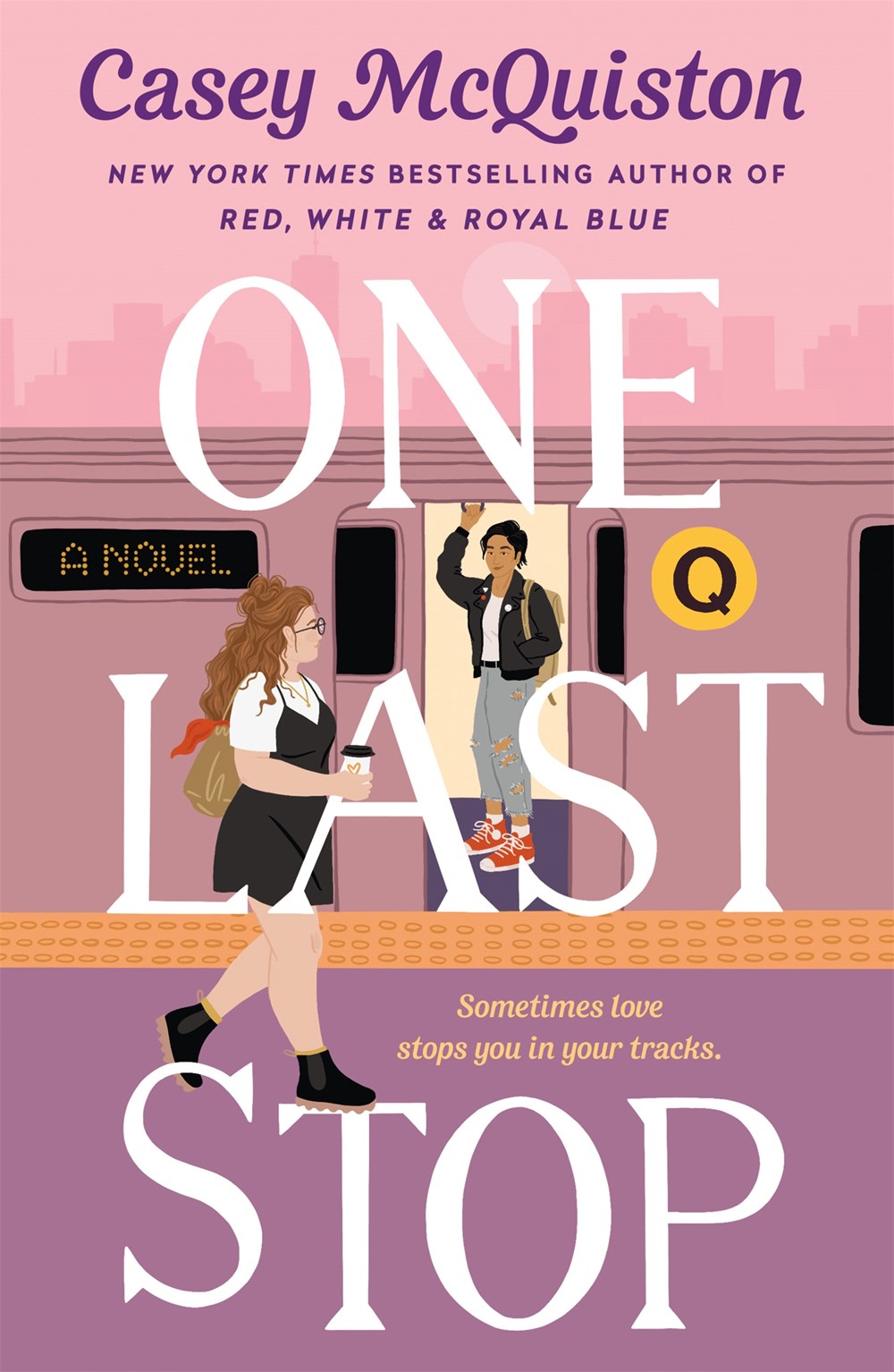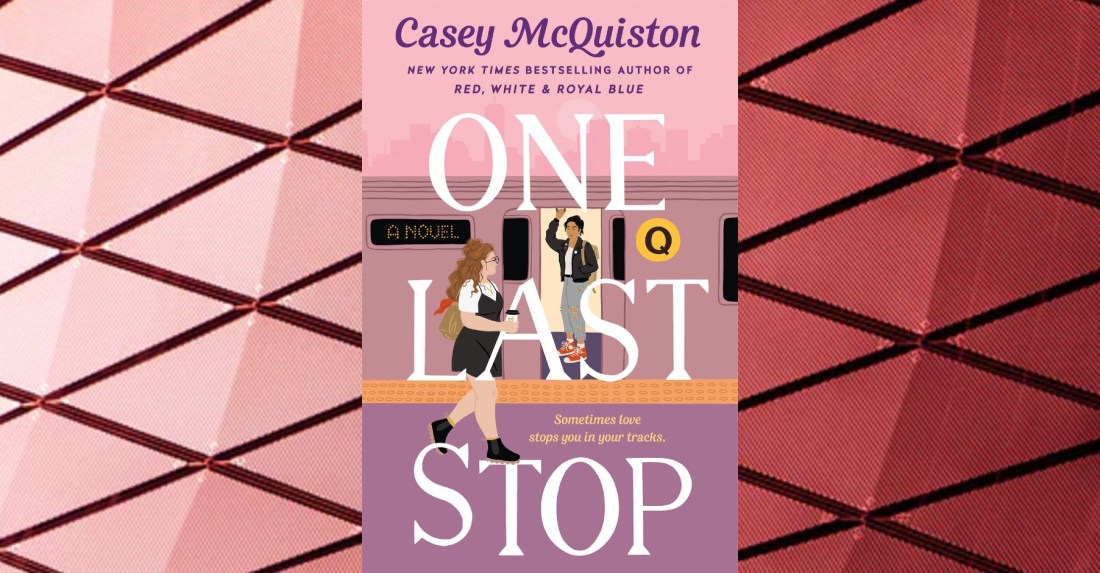Say Anything, the iconic 1989 teen dramedy, gets a lot of ink in Casey McQuiston’s contemporary queer rom-com One Last Stop. In its first pages, the mother of reformed softy August remembers the impact of John Cusack and his boombox on the childhood psyche of her daughter, the twenty-three-year-old heroine of McQuiston’s sophomore effort: “You were always crying your eyes out to that Peter Gabriel song.”
Cameron Crowe’s classic continues to crop up as cynical August finds again and again exactly what she’s trying to avoid with a move to Brooklyn (“somewhere big enough to get lost in, where being alone looks like a choice”): love and acceptance. She finds it with her quirky roommates: Niko, a trans psychic who knows August’s heart before August knows she has one; his girlfriend, Myla, an eccentric sculptor who works in frog bones and mousetrap parts; and Wes, a tattoo artist who’s cast off his blue blood family lines to drift ever closer to the red hot drag queen down the hall. She finds it at Pancake Billy’s House of Pancakes, the Brooklyn institution where she waitresses, and she finds it among the queer community that comes together to try to save the diner from gentrification. But mostly August finds it in the New York City subway system. Every time she boards a Q train, she runs into Jane, a smoldering-hot punk rocker in ripped jeans and black leather. The electricity sparks between the two at the voltage of the third rail, but August has no luck getting her crush above ground for a first date. She soon discovers why. Jane is a time traveler from the seventies doomed to ride the Q line forever.
Or maybe not forever. August quickly realizes that she may be the only one who can free Jane from the Q, an imperative with the impending closure of the line for repairs. With impressive investigative skills honed over a lifetime of assisting her mother in her search for her missing brother, August sets out to help Jane remember who she once was, the key to returning her to her own era. And, in one of many nods to the tropes of the sort of “impossible love stories” McQuiston has said she adores, it’s August and Jane’s kisses that trigger the awakening Jane needs to break the Q line’s spell.
Cue, as it were, the Say Anything references. When August begins to believe she’s not destined to be forever alone: “August used to love Say Anything before life intervened to make her hate everything, and Jane is the first person to ever make her feel all John-Cusack-and-Ione-Skye.” And later, when August sits on the Q with Jane, narrating the plot of Say Anything as they listen to the soundtrack play over shared earbuds:
It’s embarrassing to the August who likes to play tough for this stupid movie to mean so much to her, but “In Your Eyes” comes on, and Jane breathes out like she’s been punched in the gut. She gets it. August doesn’t want to think about kissing Jane when the music fades out or when the doors slide open at Parkside Ave. or when she tucks her apron under her arm and waves good night. But she does, and she does, and she does.
If you get it too — if this scene sends you to YouTube to watch that scene again (and again and again) — there’s no need to read any further. Get your copy of One Last Stop and enjoy steamy subway seductions that will have you using a public transit map to plan your next hot date; heartbreaking partings that resolve into heart-pounding returns; and kisses that have all the melting heat and heady hunger of a first:
Jane’s mouth is soft but insistent, and August feels the press of it in her body, in a place much too close to her heart. If looking at Jane feels like flowers opening, being kissed by her feels heavier, the weight of a body that’ll be gone by morning settling into bed beside her. It reminds her of being homesick for months and tasting something familiar and realizing it’s even better than you remember, because it comes with the sweet gut punch of knowing and being known. It melts in her mouth like ice cream at the corner store when she was eight. It aches like a brick to the shin.
If, on the other hand, the thought of John Cusack hoisting a boom box doesn’t turn you into a puddle — if romance isn’t your first, second, or even last pick of genre — there still may be something for you to love in this love-drenched novel.
Perhaps you go in for character-driven fiction? As in her 2019 debut, Red, White, and Royal Blue, McQuiston packs One Last Stop with a diverse cast of wacky yet adorable oddballs, Gen-Z Oscar Wildes quick with a quip on the latest trend in cocktails, styles in body art, or episode of House Hunters.
The wife of this couple sells lactation cookies, the husband designs custom stained-glass windows, and they have a budget of $750,000 and a powerful need for an open-concept kitchen and a backyard for their child, Calliope.
“Why do rich people always have the worst possible taste?” Wes says, feeding a piece of broccoli to Noodles. “Those countertops are a hate crime.”
No? Then how about detective fiction? August methodically uncovers the events that led to Jane’s entrapment on the subway — a whodunnit that intersects in satisfyingly twisty ways with August’s mother’s search for her missing brother. Historical fiction? Jane, a Chinese American butch lesbian, slowly remembers a past as an activist involved in the early battles for LGBTQ+ rights and the Asian American self-determination movement of that same era. McQuiston has done her research, and it shines through as she describes Jane’s journey from San Francisco’s Chinatown to post-Stonewall Greenwich Village.
One Last Stop will even appeal to those looking for that particular stew of steamy magic and sensual setting that defines much of the best Southern lit. McQuiston is a New Yorker these days, but she hails from New Orleans, as does August. But there’s more than that provenance that gives this book its Southern slant. Jane is not, insists Niko, a ghost, but her other worldly status definitely lends a Southern Gothic cast to the work. And there’s a decidedly Southern focus on food — the smells of certain favorites work almost as well as kisses to restore Jane’s memory — with numerous cameos from that other New Orleans native, Popeyes.
One Last Stop is also — and maybe even mostly — a panegyric to New York City. “This book is about falling in love with New York because I fell in love with New York while I was writing it,” says McQuiston, who moved to Brooklyn in 2019. She paints Flatbush as a neighborhood as lively, warm, and fun as Lin-Manuel Miranda’s Washington Heights. After reading One Last Stop, it’s hard not to dream of renting a Brooklyn walk-up, reserving a regular table at the local drag brunch, feasting every day on diner short stacks, and scheduling your next tryst on the Q, preferably as it crosses the Manhattan Bridge at night.
At one point in Say Anything, Ione Skye says to John Cusack, “No one really thinks it will work, do they?” He answers, “You just described every success story.” McQuiston’s tale of August and Jane’s impossible love — sixty percent of which takes place on the Q — shouldn’t work. But it’s a grand success, one that will satisfy fans of McQuiston’s brand of contemporary queer romantic comedy, fans of satisfyingly steamy romance fiction in general, and really, fans of well made stories of all types.

FICTION
One Last Stop
By Casey McQuiston
St. Martin’s Griffin
June 1, 2021

